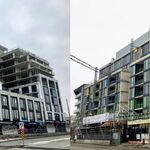A good overview of the problems with current restaurant / bar labels. And a good example of how Pantalone certainly isn't to blame for trying to find some sort of solution in the midst of very messy regulations. It'd be great for the city and those running for election to have a grown up conversation about how best to accomodate bars and restaurants in residential areas. Simply saying we live in a big city, get over it, is a pretty naive response. As is trying to create club districts. Can't we have a good balance in all neighbourhoods?
http://www.thestar.com/news/gta/article/790742--when-is-a-restaurant-really-just-a-bar
When is a restaurant really just a bar?
April 06, 2010
Patty Winsa
{{GA_Article.Images.Alttext$}}
Queen Street West establishments have presented a host of noisy problems for residents. (Feb. 19, 2010)
TONY BOCK/TORONTO STAR
You'd think it would be a good thing when prostitutes and crack addicts move out of a neighbourhood and a boutique hotel moves in.
But when the beautifully refurbished Drake Hotel opened in 2004, at the corner of Queen St. W. and Beaconsfield Ave., neighbours along a four-block strip of Queen found they had traded one set of problems for another.
Seedier elements were pushed out by new restaurants that subsequently took over vacant storefronts, and by the reopening of the likewise-renovated Gladstone Hotel. But then residents found themselves pushing their way through crowds of unruly patrons cluttering the Queen St. sidewalks between Dovercourt and Gladstone.
"Six years ago, this neighbourhood would be completely unrecognizable. There were more crackheads and prostitutes on the street, but they were quiet," said resident and activist Misha Glouberman. Now when restaurants and bars close, "there's a lot of noise, issues with vandalism and people peeing and vomiting in the doorways."
At a community meeting last May attended by about 50 people, residents complained of cigarette smoke drifting from patios and traffic congestion on what used to be quiet residential streets. They said at closing time patrons are drunk and noisy. And residents said there were just too many bars.
A city report on Queen West found many establishments licensed as restaurants were operating as bars, pushing back tables and chairs and serving more alcohol than food.
And that presents a Catch-22 for Toronto: How can a city that licenses only restaurants and entertainment facilities restrict bars?
Toronto hasn't had a "tavern" classification on the books since 1992. It was deleted after a change in provincial regulations in 1990, when the Ontario Liquor Licensing Board – now the Alcohol and Gaming Commission of Ontario – said establishments applying for liquor licences must offer a menu with enough food to make up a light meal.
That meant nearly every establishment had a kitchen, making it difficult for the city to distinguish a restaurant serving alcohol from a bar serving food. In current city bylaw parlance, "restaurant" now covers both.
Queen West residents asked if the city could redefine bars and cap their numbers, but were told it would be too difficult since every establishment is required to sell food.
As an alternative, staff recommendations passed by council in January limited the size of new restaurants so they wouldn't attract large crowds. They prohibited new dance floors and disc jockeys, and restricted new rooftop or rear-yard patios.
Councillor Gord Perks, whose Parkdale-High Park ward is west of the strip, and Ward 18 Councillor Adam Giambrone want the city to find a way to regulate bars. They've asked bylaw staff to come up with a city-wide definition for "bars" that could be used to limit their concentration.
"I don't mind a residential neighbourhood with a restaurant or two and a pub," said Perks. "But a string of pubs with a guy who has a restaurant with 350 capacity and never has any tables and barely any food? That's not a healthy part of a neighbourhood."
The problem is that since the regulation change, "basically, a bar doesn't exist" as a legal entity in Toronto, says Lynda MacDonald, a community planning manager for the city. "We have two definitions: a restaurant, which is for the service of food while (patrons) are sitting down. And an entertainment facility, which includes nightclubs, places where you dance and drink and go for an evening out."
Unlike some other large North American cities, Toronto has no way to limit the number of restaurants, or restaurants operating as bars, in a specific area. New York City, for instance, has density laws that stipulate a public hearing must be held if there is a new application for a liquor licence within 500 feet of three other licensed establishments.
Perks says the regulatory changes have created a "jurisdictional nightmare" because the alcohol and gaming commission no longer recognizes distinctions between different kinds of establishments.
In the early '90s, the agency, in consultation with municipalities, removed the old licence categories such as "dining lounge," which referred to a restaurant where all types of liquor could be served; "dining room," which meant beer or wine could be served with food; and "lounge," which allowed liquor to be served without food.
One reason that was removed was to allow municipalities, rather than the province, to decide what type of establishment should go where, said Lisa Murray, spokeswoman for the alcohol and gaming commission.
Perks says "if the (AGCO) would give us better tools to control where liquor licences go, we could be a lot more flexible about where restaurants go. That's the conundrum."

) Looks appalling:









